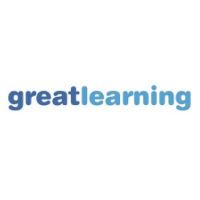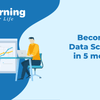
Great Learning
View Brand PublisherWith new-age tech skills disrupting the present-day job market, how can you get in on the action?
“The only skill that will be important in the 21st century is the skill of learning new skills. Everything else will become obsolete over time.”
Noted management Guru Peter Drucker may as well have been referencing the present-day job market which is evolving at a rapid pace, thanks to technologies driving digital transformation on a day-to-day basis.
In fact, even Union Finance Minister Nirmala Sitharaman, in her maiden budget speech in June, said that equipping Indian youth with relevant new-age skills in areas such as Artificial Intelligence, Internet of Things, Big Data, 3D printing, Virtual Reality and Robotics, can help them prepare to be a part of the global workforce and fill labour shortage gaps.
Of late, the focus has been how the world is going to experience a shortage of a workforce that’s skilled with adequate knowledge about technologies driving digital transformation. Nasscom’s report on Future Skills talks about the massive disruption that the tech sector is undergoing. According to the report, of the four million jobs in the industry today, the nature of at least 60-65 percent is likely to change in the next half a decade, with current job roles changing and newer roles emerging.
This is where companies like Great Learning are playing a key role in preparing this workforce of the future, by equipping them with in-demand new-age competencies.
Great Learning, a leading player in the edtech space in India offers interactive online programs and immersive classroom programs with online learning for new age tech skills such as Analytics, Data Science, Big Data, Machine Learning, Artificial Intelligence, Cloud Computing, DevOps, Full Stack Development.
Interestingly enough, these are all mentioned in the Nasscom report as emerging tech areas for which demand is rapidly increasing. Now run a simple search on the internet with the keywords “new-age tech skills” and here are just some of the headlines that pop up: “New age tech skills can help you beat the IT job market blues” or “New-age IT skills can help double your pay”.
Artificial Intelligence & Machine Learning are being applied across a wide variety of fields -- from healthcare to defence, transport, manufacturing, finance, entertainment and others. Knowledge of Business Analytics and Data Science is valuable in today’s information-fuelled age. Cloud and DevOps play a vital role in helping businesses with their digital transformation and all of these are tied together with the critical aspect of Information Security. To survive and thrive in this fast-paced world it is critical to upskill and reskill yourself with these new-age tech skills.
If you are a professional with a few years’ of work experience in your bag and going back to school full time is not really an option, what can you do to upskill or reskill yourself?
Today technology has made this choice easier, with a number of learning formats to choose from, based on the time you have and your specific requirements. Of these, online learning has emerged as a popular option.
Synchronous & Asynchronous Courses
Online or digital learning consists of both asynchronous and synchronous courses. Asynchronous courses do not happen in real time. Students are given a specific time frame to complete the course content and evaluation and their interaction with instructors is primarily via discussion boards, blogs and wikis. Synchronous courses such as webinars require the instructor and learners to interact online in real time through video, audio chat or text.
MOOCs and SPOCs
Massive Open Online Courses or MOOCS are video-based online courses that enable large numbers of participants to learn from top global universities without having to physically attend them. The programmes based on curriculum of these top universities are usually coordinated by global MOOC platforms (e.g. Coursera and edX). External MOOCS are meant for larger groups of users whereas internal MOOCS are usually targeted at niche audiences, for example an organisation looking to upskill its employees. Another learning format meant for smaller groups, Small Private Online Courses, or SPOCs, has a limited number of participants working on an ongoing project, either individually or in groups, towards a specific business context. Here, learning takes place through video lectures, interactive labs and discussion forums.
Upskilling and reskilling options designed for professionals
Then we have blended learning courses which offer the best of both worlds, digital modules along with traditional classroom sessions. The latter help in driving home the practical applications of the knowledge through case studies, situational exercises, role-playing, and more, while the online modules help strengthen theoretical knowledge.
Great Learning’s programs are a good example of this format. This unique and convenient learning format makes it easy for working professionals to upskill and reskill themselves. The blended learning model, comprises of classroom sessions for two to three days a month on weekends; and the rest of the lessons are conducted online. Great Learning also offers a completely online mentored learning format and is aimed at people who can’t make it to the classroom. Here all the learning is disseminated through videos, and on weekends live video sessions are organised with mentors. This is important since, unlike other online learning formats, students can get their queries answered and doubts cleared by the industry experts. They also get a better understanding of whether what they have learnt during the course of the week can be applied to their jobs.
“A majority of our students are mid-career professionals with four to 12 years of experience. Working professionals often cannot pursue courses at top educational institutes as they have busy schedules. So, we have chosen to go this way,” says Mohan Lakhamraju, Founder and CEO, Great Learning.
For professionals with less than three years’ experience, Great Learning offers a five-month bootcamp. All courses have an interactive element, coaching from industry experts, and offer the students an opportunity to work on actual industry projects.
Dedicated Career Assistance
In addition, Great Learning also has a flagship career assistance module called GL Excelerate. Under this, participants of Great Learning’s postgraduate programmes get dedicated career assistance in the form of interview preparation and help with polishing their resumes to make it more appealing to recruiters. They also offer curated job services, where top organisations approach Great Learning with their requirements which are listed on an exclusive job board, and participants of these programmes can apply directly through their learning portal.
Global academic collaborations
Great Learning has academic collaborations with globally renowned institutes such as Stanford Business School, The University of Texas at Austin, and Great Lakes Executive Learning. Their success metrics thus far have been impressive, with the company claiming to have the highest alumni success rates in the industry. “60% of our alumni transition to roles in their field of study within 12 months of graduation from the program, while younger professionals with 2-6 years’ experience, who have opted for a Great Learning course, have received well over 50% salary raises,” says Hari Krishnan Nair, Co-founder and Director, Great Learning.
In the six years since they started, the company has seen their alumni working in top companies such as McKinsey, Amazon, RBS, Samsung R&D, Deloitte, Philips, Barclays, Boeing, BNP Paribas, Capgemini, NASSCOM, Zomato, Swiggy and Cleartrip, among many others. Their alumni include Data Scientists, VP/Directors of Data Science, Heads of Machine Learning, Heads of Corporate Strategy, Operations Managers, Directors of Engineering, Principal Consultants, Solution Architects and people in other pivotal roles in leading global organisations.
Stay ahead in today’s fast-evolving tech-driven workplace environment. Learn more about how you take your career to the next level with Great Learning.










